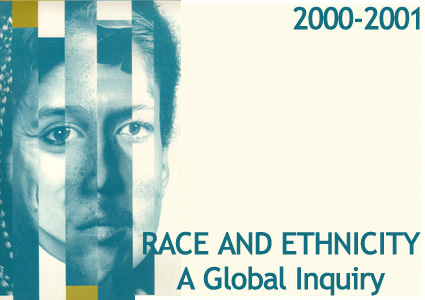- About this Program
- 2012 Conflict in the 21st Century
- 2011 Our Nuclear Age: Peril and Promise
- 2010 South Asia: Conflict, Culture Complexity, and Change
- 2009 Cities: Forging an Urban Future
- 2008 Global Poverty and Inequality
- 2007 Global Crises: Governance and Intervention
- 2006 The Politics of Fear
- 2005 Oil and Water
- 2004 Dilemmas of Empire and Nation Building
- 2003 Sovereignty and Intervention
- 2002 Global Inequities
- 2001 Race and Ethniciity: A Global Inquiry
- Class
- International Symposium
- International Symposium
- Special Events
- Special Programs
- Special Programs
- Workshops
- 2000 Global Games: Sports, Politics, and Society
- Symposium
- 1999 Global Crime, Corruption, and Accountability
- 1998 Exodus and Exile: Refugees, Migration, and Global Security
- 1997 The Future of Democracy
- 1996 Religion, Politics, and Society
- 1995 20/20 Visions of the Future
- 1994 Ethnicity, Religion and Nationalism
- 1993 Transformations in the Global Economy
- 1992 - International Security: The Environmental Dimension
- 1991 Confronting Political and Social Evil
- 1990 The Militarization of the Third World
- 1989 Drugs, International Security and U.S. Public Policy
- 1988 Foreign Policy Imperatives for the Next Presidency
- 1988 Covert Action and Democracy
- 1987 The West Bank and Gaza Strip
- 1986 International Terrorism
- News
- Press Clips
- Calendar
- Resources
EPIIC Archives
2001 Race and Ethniciity: A Global Inquiry

|
|
In an era of mass migrations, ethnic cleansing and oppression, EPIIC will confront the contentious transnational constructs and realities of race and ethnicity. What are their theories and histories? What are the vexing ethical and biological issues? How do identity formation (race, ethnicity, class, nationalism, gender), citizenship, political participation, power relationships, and nation-state consolidation affect public policy and inter- and intra-group interactions? This will be a multidisciplinary introduction to the current intellectual discourse an decisive policy debates over dilemmas of power, prejudice, and discrimination.
The symposium will probe the meanings and manipulations of the politics of recognition, of culture and identity, and consider the principles and practices of justice and reconciliation. Against a backdrop of historical and contemporary stratification segregation and xenophobia -- in Bosnia, Brazil, France, Germany, Nigeria, South Africa, Spain, Sri Lanka, the U.S. and beyond -- we will explore the political and psychological factors in racial and ethnic conflict.
And, we will investigate ethnic conflict an peacekeeping in multiethnic societies; diasporas; immigration; environmental racism; race, crime, and the law in democratic nations; indigenous rights and development; reparations; strategies for inter-racial and inter-ethnic coalition building; an means of transforming cultures of intolerance.
Finally, we were pleased to award Dr. Jean Mayer Global Citizenship Awards to K. Anthony Appiah, Pumla Gobodo-Madikizela, Richard J. Goldstone, Donald L. Horowitz, Ronald Takaki, and John Wallach.

